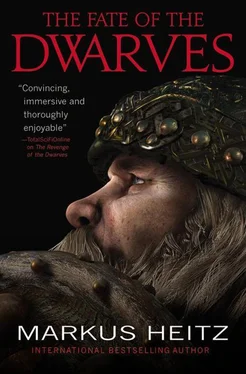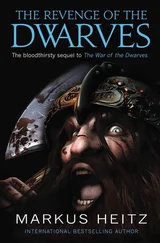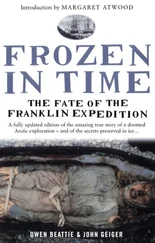Markus Heitz - The Fate of the Dwarves
Здесь есть возможность читать онлайн «Markus Heitz - The Fate of the Dwarves» весь текст электронной книги совершенно бесплатно (целиком полную версию без сокращений). В некоторых случаях можно слушать аудио, скачать через торрент в формате fb2 и присутствует краткое содержание. Жанр: Фэнтези, на английском языке. Описание произведения, (предисловие) а так же отзывы посетителей доступны на портале библиотеки ЛибКат.
- Название:The Fate of the Dwarves
- Автор:
- Жанр:
- Год:неизвестен
- ISBN:нет данных
- Рейтинг книги:4 / 5. Голосов: 1
-
Избранное:Добавить в избранное
- Отзывы:
-
Ваша оценка:
- 80
- 1
- 2
- 3
- 4
- 5
The Fate of the Dwarves: краткое содержание, описание и аннотация
Предлагаем к чтению аннотацию, описание, краткое содержание или предисловие (зависит от того, что написал сам автор книги «The Fate of the Dwarves»). Если вы не нашли необходимую информацию о книге — напишите в комментариях, мы постараемся отыскать её.
The Fate of the Dwarves — читать онлайн бесплатно полную книгу (весь текст) целиком
Ниже представлен текст книги, разбитый по страницам. Система сохранения места последней прочитанной страницы, позволяет с удобством читать онлайн бесплатно книгу «The Fate of the Dwarves», без необходимости каждый раз заново искать на чём Вы остановились. Поставьте закладку, и сможете в любой момент перейти на страницу, на которой закончили чтение.
Интервал:
Закладка:
Coira had not thought it possible, but somehow she had managed to throw off her pursuers. She had acquired three extra horses, loaded them up with heavy weights, and led them alongside their own group for some time. After half an orbit’s journey riding along the bed of a stream, she had let these three animals go free, while she herself rode on toward Lakepride. That had foxed whoever was following her. For now.
But her name was on the list of Weyurn folk with a high price on their heads, should anyone think of betraying her and taking hers to the Dragon. That had not made her journey an easy one.
She looked at Rodario riding beside her, bravely clinging on to the horse’s back. They’d had to stop and wait four times already for him to remount after a fall.
“Not long now and we’ll be safe,” she said, to encourage him. “Can you see the island? It’s one of the few proper islands left in my mother’s realm. We’ll have to go by boat.”
A cry of dismay escaped his lips. “Deep water? I can’t swim.”
“In the old days every child in Weyurn could swim,” tutted Loytan disapprovingly.
“That must have been a really long time ago. I’d say about a hundred cycles, at least? And anyway, I’m not from Weyurn,” Rodario returned, sharply. “There was never any need for me to get to grip with the waves. A stream is quite sufficient for a good wash, and for rivers there are always bridges and ferries.”
“This time we don’t have a bridge to offer you,” laughed Coira. “It’s only a short boat-ride. But, of course, if you can walk on water, please go ahead.”
“Very funny, Princess,” said Rodario, sounding hurt, though whether he really meant it or was just pretending it was impossible to tell.
They rode to the top of a sand dune, the sparse vegetation of which waved in the wind. There was hoarfrost on the grass stems, giving the appearance of glass; they rustled against each other, shimmering in the sunlight.
“Oh, how beautiful!” said Rodario, enchanted. “I wish I had pen and paper right now to write about it!”
Loytan groaned. “If you write stuff as bad as that act you did in the market square, give it a miss, for goodness’ sake.”
Coira threw her companion a reproving look but said nothing.
Rodario’s eyes narrowed. “One of these orbits you’ll get a surprise when you see what I can do, Count Loytan,” he prophesied. “And I bet you’ll come running to apologize.”
As he spoke, something in the actor’s gaze brought Loytan up short. Was it a sudden manliness? Probably just imagination. “And you’ll probably save my life and then marry the princess, I suppose?” He laughed, startling the seagulls.
“Why not?” The actor grinned at Coira and rubbed his ungroomed beard. “Do you find me so ugly, or may I dream of a life at your side…?”
She raised a finger in warning. “You are speaking out of turn, Rodario the Seventh! Consider who it is that you are addressing.” She rode down the dune, heading for a narrow quay where a skiff lay moored, its small sail furled.
Rodario looked over to the island. It had to be a good mile from the shore.
But island was not really the expression to use. Ever since the water level in Weyurn’s lakes had started to drop, cycle after cycle, many of the islands stood high above the surface, while others had been left completely isolated, far from the waterline. The inhabitants had installed pulley lifts and built flights of stairs to enable them to leave their islands. Fishermen had been forced to become farmers, turning the lakebed into agricultural land-not always very fertile land, at that.
The situation for Lakepride was not so critical. It seemed to float above the lake maybe sixty paces up, balanced on a stone pillar, resembling a tulip flower on its stem.
Rodario noted seven barges, three ships and eighteen smaller vessels moored at a landing stage below the island; the landing stage was secured by heavy chains and there was a precarious-looking spiral staircase leading up to where the people lived. He could see windlasses and pulleys among the equipment on the landing stage. The residents of Lakepride had made the best of their predicament.
“The island looks as if it might break off at any moment and come crashing down into the lake,” said Rodario to Loytan, who nodded.
“Yes, you’d think so, but the pillar of stone it rests on is volcanic rock. Nothing can bring that down.” He urged his horse onward down the side of the dune, more sliding than walking down. Rodario followed suit. “The people of Lakepride are lucky; at least they can still work as fisherfolk.”
They waited by the low-slung sailing barge for the ferryman to emerge from his little hut. He wore a long dark-blue garment that did not disguise the strong shoulder muscles rippling beneath the fabric. Round his neck he wore the white kerchief of his guild, and his wrists were protected by leather supports to aid in the heavy work of propelling the boat. He recognized Coira immediately and bowed low. “It will be an honor, Princess, to take you back to your palace,” he said respectfully, inviting her onto his boat.
As always she attempted to pay for his services and as always the payment was declined. She smiled at him. “If any orcs turn up looking for us…”
“I’ll tell them I haven’t seen you,” said the man. “And if they want to cross I’ll tell them the boat has sprung a leak.”
Coira stepped into the boat and patted her horse’s neck. “Don’t put yourself in danger on my account. Ferry them over if they insist, but I don’t think they’ll dare. The island is my undisputed realm. They know they can’t harm me there.”
Rodario and Loytan dismounted, as she had done, and held their animal’s reins tightly while the ferryman hoisted the sail and started the crossing.
He had to tack against the wind, so they reached the landing stage in a wide arc. It brought huge rusty iron walls into view rising from the water below the island and a little to the east.
Rodario had noticed the structure and craned his neck to see more. “What is that? A groyne to protect the island?”
“No. It’s a bulkhead.” Coira instructed the ferryman to change course so that they could inspect it.
“Bulkhead? What’s that when it’s at home?”
“It’s to support the sides of a shaft. It’s where we’re heading first, so you’ll have the chance to admire the dwarves’ engineering skill,” she explained. “The fifthlings built it at my great-grandmother’s request.”
“A shaft. In the middle of a lake. But… what for? And how deep does it go?” He was so excited that he walked forward to the bow. The breeze lifted his brown hair and played through his beard.
The ferry headed straight for the structure and Rodario could soon make out the dwarf-runes on the walls. A single iron plate was four paces wide and one pace thick. Ten of these placed side by side formed one wall, and hefty steel girders braced them diagonally. Algae and barnacles covered the outside and there was a metallic smell.
“But it’s…” Rodario was at a loss for words to describe this impressive structure.
“It goes down two hundred paces below the keel of our boat,” said Coira, amused at the man’s childlike enthusiasm. She took her scarf and tied it round her hair to keep it back. “That’s how deep those metal walls go. At the bottom you can walk about without getting your feet wet, but I shan’t take you with me when I go down, so you won’t be able to see.”
He turned to her. “Go down? You’re going down there? What for?”
“Have a think and see if you can work it out for yourself.” She raised her hand in greeting to a helmeted figure and called out three words that Rodario could not understand, an answer coming back in return. “I was giving the password. If they don’t hear it the guards will sink any ship that approaches,” she told him.
Читать дальшеИнтервал:
Закладка:
Похожие книги на «The Fate of the Dwarves»
Представляем Вашему вниманию похожие книги на «The Fate of the Dwarves» списком для выбора. Мы отобрали схожую по названию и смыслу литературу в надежде предоставить читателям больше вариантов отыскать новые, интересные, ещё непрочитанные произведения.
Обсуждение, отзывы о книге «The Fate of the Dwarves» и просто собственные мнения читателей. Оставьте ваши комментарии, напишите, что Вы думаете о произведении, его смысле или главных героях. Укажите что конкретно понравилось, а что нет, и почему Вы так считаете.










